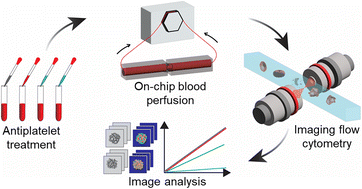Studying the efficacy of antiplatelet drugs on atherosclerosis by optofluidic imaging on a chip†
Abstract
Vascular stenosis caused by atherosclerosis instigates activation and aggregation of platelets, eventually resulting in thrombus formation. Although antiplatelet drugs are commonly used to inhibit platelet activation and aggregation, they unfortunately cannot prevent recurrent thrombotic events in patients with atherosclerosis. This is partially due to the limited understanding of the efficacy of antiplatelet drugs in the complex hemodynamic environment of vascular stenosis. Conventional methods for evaluating the efficacy of antiplatelet drugs under stenosis either fail to simulate the hemodynamic environment of vascular stenosis characterized by high shear stress and recirculatory flow or lack spatial resolution in their analytical techniques to statistically identify and characterize platelet aggregates. Here we propose and experimentally demonstrate a method comprising an in vitro 3D stenosis microfluidic chip and an optical time-stretch quantitative phase imaging system for studying the efficacy of antiplatelet drugs under stenosis. Our method simulates the atherogenic flow environment of vascular stenosis while enabling high-resolution and statistical analysis of platelet aggregates. Using our method, we distinguished the efficacy of three antiplatelet drugs, acetylsalicylic acid (ASA), cangrelor, and eptifibatide, for inhibiting platelet aggregation induced by stenosis. Specifically, ASA failed to inhibit stenosis-induced platelet aggregation, while eptifibatide and cangrelor showed high and moderate efficacy, respectively. Furthermore, we demonstrated that the drugs tested also differed in their efficacy for inhibiting platelet aggregation synergistically induced by stenosis and agonists (e.g., adenosine diphosphate, and collagen). Taken together, our method is an effective tool for investigating the efficacy of antiplatelet drugs under vascular stenosis, which could assist the development of optimal pharmacologic strategies for patients with atherosclerosis.

- This article is part of the themed collection: Lab on a Chip HOT Articles 2023


 Please wait while we load your content...
Please wait while we load your content...